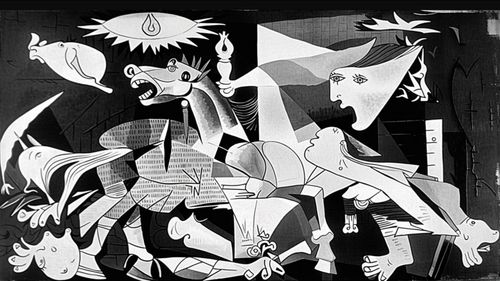Guernica Explained: Picasso's Haunting Scream Against War's Brutality
Jun 26, 2024 · 2 mins read
0
Share

Picasso's "Guernica" is the art equivalent of a scream: echoing the horrors of the Spanish Civil War and transcending time as a universal symbol of war's atrocities.
Save
Share
Born from the ashes of the bombed Basque town, Guernica, in 1937, this masterpiece was Picasso's response to the news of the devastation, a visual protest against the brutality of war.
Save
Share
The mural-sized canvas is a chaotic tableau of agony, featuring a gored horse, a dismembered soldier, and a wailing woman – a visual bombardment of fragmented images that pays testament to the suffering inflicted by war.
Save
Share
Unlike the colorful vibrancy typical of Picasso's work, "Guernica" is rendered in stark black, white, and grays, a choice that amplifies its grim message and universal mourning.
Save
Share
At the heart of the painting, a light bulb blazes like an evil eye, casting a harsh light on the scene below. This "bomb" of illumination exposes the darkness of human cruelty.
Save
Share
Picasso's distorted figures are not just stylistic choices; they embody the agony and despair of the victims. The central figure of the horse, with its gaping mouth and piercing eyes, is a symbol of the innocent caught in the crossfire.
Save
Share
"Guernica" was a political statement as much as an artistic one. Exhibited at the 1937 World's Fair in Paris, it was Picasso's plea to the world to wake up to the fascist threat.
Save
Share
In fact, "Guernica" traveled the world to raise funds for Spanish war relief. Picasso vowed that the artwork would not return to Spain until liberty and democracy were restored, a promise kept until 1981, years after the dictator Franco's death.
Save
Share
The painting's impact is magnified by its scale, over 11 feet tall and 25.6 feet wide, engulfing viewers in its narrative of pain and protest, making it impossible to remain indifferent.
Save
Share
Today, "Guernica" hangs in Madrid's Reina Sofia Museum, not just as a relic of the past, but as a perpetual reminder of the cost of war and the enduring power of art to bear witness.
Save
Share
0